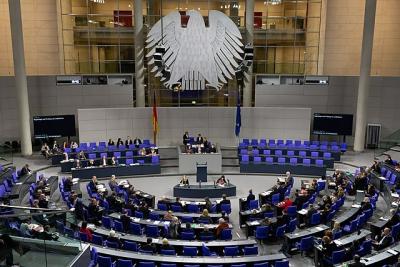"There were around 165,000 last year. This year, it will probably be 180,000. Germany is experiencing a wave of emigration of historic dimensions." Every year, author Wolfram Weimer continues, a city as big as Würzburg or Osnabrück disappears. Highly qualified workers, mostly young, are voting with their feet. Germany would face a shortage of skilled workers. The motivation? 68 percent of the emigrants expected a better job and more money abroad. Most were bothered by the bureaucracy in Germany, and popular destinations included Canada, the USA and Switzerland.
This wake-up call dates back to the 2000s. However, the problem is as topical now as it was then. Especially since Germany has since tried to cope with its "brain drain" not through qualified immigration, but through illegal mass immigration. Time and again, German politicians have tried to gloss over unregulated migration by citing a shortage of skilled workers. Yet it would already be helpful if Germany tried to keep its own elite in the country rather than fill the vacuum with people who cause new problems. Native elites do not need German lessons, do not need integration, do not need education, do not need social assistance. Yet people in Germany still talk more about immigration than emigration - even though the above text by Weimer from the journal "Cicero" is 20 years old. The reason for this: between 2009 and 2015, the Germans' willingness to emigrate declined massively again.
But that was apparently only a snapshot. The times of emigration are back again. As then, the two North American countries and the Swiss Confederation are dream destinations for Germans. In Europe, however, new places have been added. The neighbouring country of Austria, for example - or Hungary. The "horror figures" from back then look almost harmless compared to today's statistics. The years of the migration crisis are considered to be 2015/2016. However, the fact that the same period saw records not only for immigration but also for emigration remains largely forgotten. In 2016, around 280,000 Germans packed their bags and left – while the year before there were only around 140,000. And since that time an average of 250,000 Germans have emigrated every year.
In the meantime, there is a remarkable German diaspora. It is particularly pronounced in Switzerland and Austria, with around 300,000 and 200,000 Germans in exile respectively; in Great Britain and Spain, the community numbers around 140,000 people each. Around 160,000 live in Canada as of 2020.
If one looks solely at the immigration and emigration of persons with German citizenship between the Federal territory and abroad, the balance has been consistently negative since 2005. Here, too, the year 2016 marks the negative record with around 135,000 emigrations. The AfD is already drawing comparisons to the great waves of German emigration in the last third of the 19th century. Mind you: at that time, the population growth of the "autochthonous" Germans exploded. Mass immigration from other cultures was not yet the order of the day. Therefore, the dramatic nature of today's development cannot be overemphasised.
Of course, one may speculate about the reasons and causes. In some cases, for example, it is not so much the young and highly qualified who are emigrating, but also numerous pensioners who want to spend their twilight years in a warmer or cheaper place. Currently, many representatives of the "boomer generation" are retiring and seeking their salvation abroad. Hungary, for example, is the place of choice for many Germans who want to spend their retirement more safely than in Germany, which seems insecure. The country's conservative attitude probably does the rest. Even exotic destinations like Paraguay are suddenly gaining appeal. The classic overseas destinations of the USA and Canada are likely to exert the same attraction as ever: the promise that performance is better paid there than in Germany and that there is no bureaucracy is still attracting not only Central Europeans. Australia also has a similar reputation.
Politically, there has been no response to the phenomenon so far – or as little as in the 2000s. At that time, observers also interpreted emigration as a response to Gerhard Schröder's ruling Red-Green coalition and left-wing policies. That Germany should benefit from Schröder's reforms of all things, which led to the economic recovery under Angela Merkel, is an unspoken secret. However, social democracy has never benefited from this. On the contrary, since then its spin-off, the Left Party, has been driving social democracy towards much more left-wing policies than 20 years ago. Meanwhile, the Federal Republic appears to be business-friendly first and foremost towards big business, but not towards small and medium-sized enterprises - which was confirmed most recently during the Corona period.
And the “Ampel” (“traffic light”) government in power today? It is mainly considering how it can satisfy large parts of the lower class with a "citizen's income" (“Bürgergeld”) based on the watering-can principle or even win them over as loyal voters, while the middle class and families continue to languish. Project funding is readily available for green projects and LGBT politics. Meanwhile, the middle classes do what they have been doing since the emperor’s time: pay, pay and pay.
Read also
China and the Prigozhin campaign
How the uprising of Wagner Group leader Yevgeny Prigozhin must be evaluated is a chapter in itself. On the day of the alleged mutiny, events rolled over so quickly that one hardly noticed who did not speak out. While Putin was on the phone with Kazakhstan and Turkey, and the Belarusian Security Council as well as Iran reacted quickly, it was noticeable that one of the Russians' partners remained silent: namely, the People's Republic of China.
Marco Gallina
In the stranglehold of the climate extremists
At the carnival parade in Düsseldorf, one float caught the eye: it showed a member of the climate extremist "Last Generation" fighting a “car monster”. Düsseldorf thus adopted the common narrative of "David against Goliath" and assigned the role of heroes to the extremists - not least because the slogan underneath, "Who's the climate terrorist here?" made it clear that the CO2 guzzlers are responsible, not the activists.
Marco Gallina
The Individual on the Defensive
Do Nazis have a right to life? Outside Germany, such a debate might seem perplexing. But during the last days of May, discussions in Germany revolved around nothing less, after a left-wing extremist was released under quite lenient conditions.
Marco Gallina
A King for Germany
King Charles III visited Germany, continuing thus a line of tradition established by his mother. Not so much the visit itself, but rather the reactions to it cast a telling light on Germany in particular, and Europe in general. Monarchy, one could have the impression, is actually something that belonged to the Middle Ages.














Comments (0)